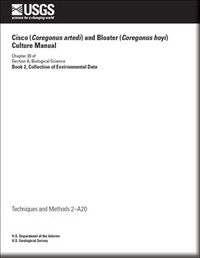Cisco (Coregonus artedi) and Bloater (Coregonus hoyi) Culture Manual
Links
- Document: Report (4.6 MB pdf) , HTML , XML
- Download citation as: RIS | Dublin Core
Abstract
The primary objective of the Coregonine Research Program established at the U.S. Geological Survey, Great Lakes Science Center, Tunison Laboratory of Aquatic Science as mandated by the Great Lakes Restoration Initiative is to restore native coregonines, specifically Coregonus artedi (Lesueur, 1818; ciscoes) and Coregonus hoyi (Milner, 1874; bloaters) into Lake Ontario. This objective focuses on providing an alternative food source for top predators and improving the ecological function of Lake Ontario as it relates to native versus invasive species control. To complete this goal, hatchery techniques were developed to grow ciscoes and bloaters; these techniques are described in this standard operating manual.
Suggested Citation
Chalupnicki, M.A., Mackey, G.E., and McKenna, J.E., Jr., 2024, Cisco (Coregonus artedi) and bloater (Coregonus hoyi) culture manual: U.S. Geological Survey Techniques and Methods, book 2, chap. A20, 25 p., https://doi.org/10.3133/tm2A20.
ISSN: 2328-7055 (online)
Table of Contents
- Acknowledgments
- Abstract
- Introduction
- Adult Brood Collection
- Spawning
- Bloater
- Disease Certification
- Fish Disease Assays
- Adult Brood Genetic Parentage Analysis
- Egg Incubation
- Development
- Larval Rearing
- Feeding
- Chemical Marking
- Stocking
- Record Keeping, Data Management, and Reporting
- References Cited
| Publication type | Report |
|---|---|
| Publication Subtype | USGS Numbered Series |
| Title | Cisco (Coregonus artedi) and bloater (Coregonus hoyi) culture manual |
| Series title | Techniques and Methods |
| Series number | 2-A20 |
| DOI | 10.3133/tm2A20 |
| Publication Date | January 18, 2024 |
| Year Published | 2024 |
| Language | English |
| Publisher | U.S. Geological Survey |
| Publisher location | Reston, VA |
| Contributing office(s) | Great Lakes Science Center |
| Description | viii, 25 p. |
| Online Only (Y/N) | Y |
| Additional Online Files (Y/N) | N |


